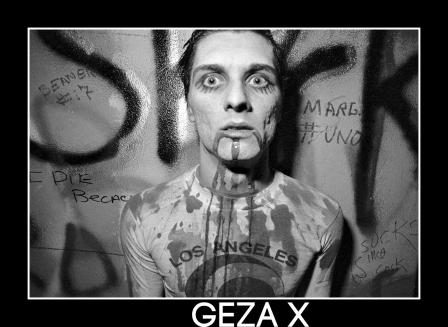Recently, Punk Globe got the chance to speak with legendary record producer Geza X. He has remained true to the underground, still offering inexpensive mastering to indie bands. He says he likes being the very first person to hear a great new song. You can find out more about Geza X and his studio here https://www.facebook.com/studioxla11/ And you can follow his career on Instagram here https://www.instagram.com/gezaxx/ In this interview, Geza X speaks about his influences and his well-known work with The Germs, The Dead Kennedys and Black Flag. Geza X has also remastered the entire PoshBoy catalogue for the 40th anniversary of punk. He speaks openly about the philosophy of punk,The Masque Club and about the documentary movie he’s currently filming. In which he interviews the one and only Ginger Coyote among many others.
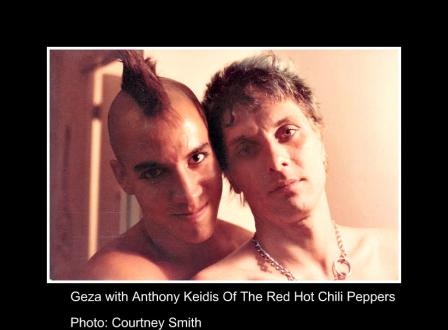
Punk Globe: Tell us about your first introduction to recording.
Geza: My family had this do-everything box called” The Recordio”. It was a tape recorder, a PA system, a record player, and you could also MAKE records on it! Well I was only 4 years old but I could hardly wait to get my hands on it. I was always getting in trouble with gadgets, I used to take my toys apart to see how they worked and put them back together again. And for a while literally EVERY wall outlet had a big ugly black scar above it from me putting scissors and screwdrivers in there and making huge sparks. By the time I was 5 I had probably gotten about 3000 electric shocks so it’s a wonder I'm still alive. My parents installed special plugs but once I figured out how to get around that the game was on again.
Punk Globe: How did you become interested in rock music?
Geza: I loved classical music from an early age and by the age of 4, I could name any piece of classical music. So when I was about 5 or so was my sister decided to take me up in the attic where she had a little record player and play me Elvis songs and other rock and roll 45’s. She was about 15 at the time and a real “bobby soxer”. And she would make me guess the name of the song and the artist. She said that was a lot cooler than knowing the classics. So I developed a taste for rock and roll early.
Punk Globe: When did you start playing the guitar?
Geza: Around age 13. By the time the 1960’s hit I was playing the guitar in bands and singing, but frankly my musical taste was a lot stronger than my actual chops. I have a reputation for playing exotic guitar parts but it never came easily to me, I was totally unable to learn music theory due to severe ADHD. So I had to learn to play everything by ear and THAT became my superpower. I have really keen hearing and can tell if something is in tune or sounds right, even in a sea of noise. In fact I love noise and believe there is good noise and bad noise. I’ve made quite a lot of noise in my career, on guitars, synthesizers, household objects, and such. It’s a personal thing.
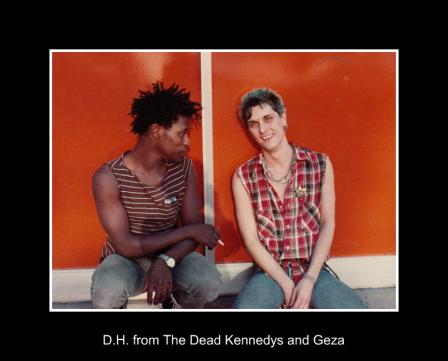
Punk Globe: Why are you considered the first white person to use the letter X as a “thing”?
Geza: Well, in the mid-70’s I returned to Los Angeles after spending several years hitchhiking up and down the California coast with my guitar and my dog. I began to collect other people who also liked the sort of crude, noisy rock and experimental stuff that I liked. I called that "X-Music" (in homage to Malcolm X, a highly political intellectual rebel outsider attempting to change the white world’s view of black people). But I wanted to change MUSIC. I felt like an outsider myself, from years of getting bullied in elementary school and an insane mother. I was also badly traumatized by a nun who had a hook for one hand. If she was mad at you, she would return your homework with the hooked hand. I remember one incident when she chased me all over the playground, habit flying in the air behind her, snapping her HOOK at me because she was so mad! That will turn anyone into a weirdo. So I wanted to give up my “slave name” like Malcolm X, and turned my angst into rowdy, anti-melodic protopunk. By 1972 I had the name Geza X on my driver’s license and started telling everyone my theories about the letter X and its occult powers.
Punk Globe: How did you learn about occult symbolism?
Geza: It was almost accidental. I had joined a very weird band called The Silver Chalice whose goal was to find missing Christian artifacts that Hitler had stolen during World War II and rule the world with hard rock. We failed at that, but the band kept getting better and better, eventually attracting notable musicians like Joe Nanini, Don Bolles, Don Bonebrake, Rob Graves, myself, and of course Kim Komet, the Jim Morrison-like singer writer who started it all. Unlike Morrison, Kim used to drink a bottle of Wesson oil at shows, pulled his pubes out with pliers and much much more. His mother was a Gnostic Witch, for lack of a better term, and they had a huge library of rare books. It was from those two, Kim and his mom, that I learned cancer cures, Rosicrucian mysteries, Madame Blavatsky, Tarot reading and all sorts of other esoterica. I’m not actively a “witch” but I absorbed that shit inside-out by osmosis.
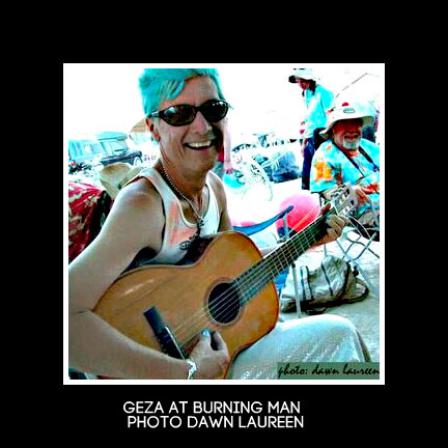
Punk Globe: Where did you get your production aesthetic?
Geza: All of us proto-punks in the early 70’s hated overproduced music like progressive rock and Disco. We felt that music had become inaccessible and hard to play. We followed loud garage bands like The Seeds, Standells, Iggy & The Stooges, Captain Beefheart and Blue Cheer. Anything heavy and noisy and slightly atonal or weird was perfect for us. Kim and I used to scour thrift stores looking for the WORST 45’s we could find, weird shit with no redeeming value. I also liked the psychedelic bands like Jefferson Airplane and Quicksilver Messenger Service, especially the long noise jams we would hear bootlegs of from time to time. But I didn’t like Grateful Dead, I thought they were terribly over-rated and boring.
Punk Globe: How did you finally get started in “real” recording?
Geza: I needed a job and took up residence on the floor of Artists Recording Studios in 1975. It was located directly across the street from the legendary alley that was soon to become The Masque. I literally slept on the floor and cleaned the toilets and fixed microphones. But now and then an engineer wouldn’t show up for a session. So guess who got tapped to record the Mariachi and Norteño bands that would drive up to Los Angeles with a case of J&B whiskey? ME, because the price of a studio in Hollywood was about half that of one in Mexico City and our studio didn't wanna lose the session. That’s how I learned to operate recording equipment, trial by fire. I had no formal training except The Recordio; and in those days there were NO textbooks or classes yet. So I only had a flimsy understanding of record engineering when Punk Rock hit—I was mainly a live sound engineer at that time and making demos on my 4 track.
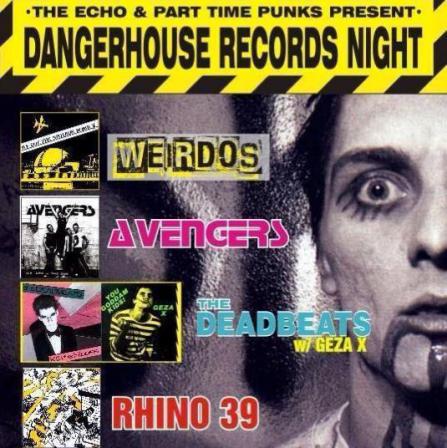
Punk Globe: Tell us about the early days of punk rock in Los Angeles?
Geza: I remember the very early days in 1975 when I rented a house in Hollywood. Joe Nanini (future Wall Of Voodoo drummer) moved there from Santa Maria, a small cow town in Mid-California where I had spent a couple of amazing years. Then I started dating Charlotte Caffey (future Go-Gos) and she introduced me to some musicians like Joe Ramirez (Future Eyes) who also moved in to my protopunk household. Tito Larriva (future Plugz) would come visit us frequently. He had just finished a stint in Mexico City, where he had his own TV show. He was amazing, no one has EVER really seen how talented he is. There was another regular, a Dylanesque songwriter named Cotton who played the local pubs. He was a major talent too. He showed us around the scene and we played shows with him often, mostly acoustic or semi-acoustic, at places like Barneys Beanery. There was VERY little amplified music at the time, LA really sucked in 1975!
Punk Globe: How did you make a living back then?
Geza: In 1975 I bought a nice 4-track recorder called The Dokorder and began to do demos, mostly of us, on it. Charlotte, the two Joes and I started a group called Tornado Babies. Later we changed that to Band X (no relation to the legendary X with Exene and John). I started a sound company called Surgical Sound with Charlotte and Joe Ramirez. We would show up in medical lab coats with a small PA system and do local shows all over town including Watts and Compton. We had a lot of black clients we picked up from The Recycler, a local Craigslist type paper. They told us they were skeptical when they saw our crazy white asses show up in lab coats but they really liked our work and kept calling us back. We discovered quite a few local clubs that way and that helped us later when we started looking for gigs ourselves. It was a fun time, I called the house we lived in “X Projects” and made everyone answer the phone like that.
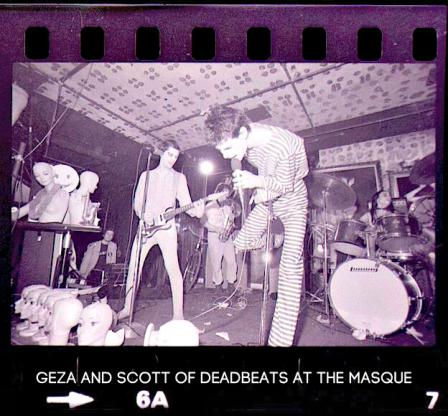
Photo by Michael Yampolski
Punk Globe: What was your first contact with Punk Rock?
Geza: Somewhere around 1976, Joe Nanini came home with a vinyl record and said: “You, of all the people I know, need to hear this…” He made me SIT DOWN and he played “God Save The Queen” by the Sex Pistols. I still get chills when I talk about that moment. Yeah it changed my life. I made him play it about 20 times in a row. I had been waiting to hear something like that for about 10 years. It was sorta like Iggy, The Standells, The Seeds, protest music, primitive loud simple chord changes, noise—everythiing I loved all rolled into one. You have to remember that in the mid 70’s there was NO rock music in LA, it was all Disco and singer-songwriter stuff like James Taylor. Boring!
Punk Globe: How did you get involved in the scene?
Geza: Shortly after that, Joe and I went to see The Weirdos, The Damned, The Ramones. And one of those shows was where I first saw Bobby Pyn, later Darby Crash, standing by the stage and clearly taking notes. He totally grossed me out, he was acting like a little fairy and making the 3 blonde girls with him buy him beers and bring him things. It creeped me out because they were all crying and I could hear them whispering to one another at the bar, saying “…I just KNOW he’s really gonna DO it someday…” The girls were Belinda Carlisle (future Go-Gos), Malissa Hutton (who did all of their blonde hair), and Lorna Doom (Germs bassist). Ever though I was standing at a distance I could see that something was not quite right so that strange moment got seared in my memory. Of course they were talking about his future suicide, which he often made a point of advertising, even way back then. He was a very sick puppy but he also had a weird magnetism and charisma, and beautiful grey-blue wolf eyes. He was intelligent too but a total nihilist, he just didn't care about anything except writing poetry and becoming a legend. He called it his Five Year Plan. Create total mayhem and then kill himself.
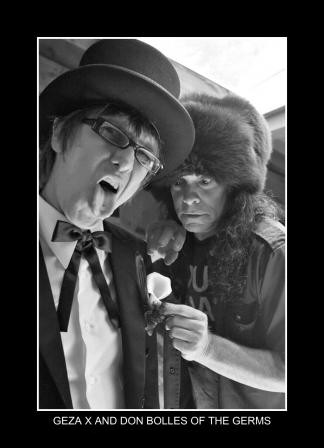
Photo by Claire Mallett
Punk Globe: What was Darby like? There are so many stories...
Geza: My relationship with Darby was love-hate. He was a cute little friendly kid who reminded me of the Pillsbury Dough Boy. I remember having dozens of heated drunken debates with him in the earliest days, arguments over the use of power and social responsibility. Alice Bag will tell you the same thing. He could give a fuck. Before there were any punk clubs we would hang out at Malissa Hutton’s apartment, or Joan Jett’s, or the Plunger Pit with Trudie and Hellin. And drink like rockstars and have philosophical discussions. He was like a little Dennis The Menace. A young boy holding a lit stick of dynamite in his hand. He knew that. And he liked it. One time, when he jumped off the balcony at The Whisky, right onto a broken bottle that went straight up his HEEL, he finished the set before going to the hospital and getting a cast on it. When I later asked him how that felt, he said he LIKED it! I wondered what was wrong with him for a long time afterward. And I still do. I've shed a few dark tears over that young brat.
Punk Globe: Is it true you were in the original Bags?
Geza: Yeah, Joe and I instantly wanted to join a punk band after The Weirdos-Damned show. He found some girls who wanted to start an all-girl band. But they needed a drummer and guitarist so badly they let us try out anyway. That, of course, was Alice Bag and Patricia Morrison. Alice is a great band leader, it was very exciting to be brought into the middle of the cool kids clique so suddenly. They were well plugged in to the freshly-starting scene and introduced us to everyone who mattered. We would go to shows incognito—in our Bags outfits—to build mystery about our new band. And then we would do a quick clothing change and reappear as “ourselves”, asking if people had seen the strange new band walking around. It caused a sensation. There was an actual RIOT at our second show, at the world-famous Troubadour. The owner, Doug Weston, BANNED punk for years afterward. Tom Waits was there, and many people think he had some sort of spiritual experience because after that he morphed his whole musical style into the beautiful old-world Dada ballads he is so dearly loved for.
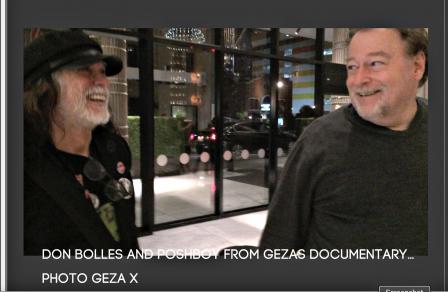
Punk Globe: Why was it called The Bags? Did you wear bags on your heads? I recall seeing some early photos.
Geza: Yes, we actually wore bags on our heads at first, in homage to a famous Damned photo we saw in an English magazine. My bag had bloody tampons on it and i mooned people a lot at our shows. Dressing like that got us a reputation very quickly, although it was hard to play with a bag on. I made many friends but I especially liked Alice’s boyfriend, Weirdos drummer Nickey Beat, (now Nickey Alexander of The Cramps). I followed him around like a puppy dog. He took me all over town introducing me and showing me how to make punk clothes. He was a genius with t-shirts. In fact, when The Bags kicked me out for being TOO punk he took me to meet The Deadbeats, which turned out to be a match made in heaven, because they played kooky art-rock like me. But also we had really great musicianship and performance art and we were LOUD as fuck. I love wearing costumes and pissing people off, so that band was PERFECT for me.
Punk Globe: How did you end up living at The Masque?
Geza: Around that same time, we all started rehearsing in a weird super-cheap basement called The Masque. It was run by a wonderful, poetic Scottish fellow named Brendan Mullen. Brendan and I became fast friends, we both loved weird music and Dada. So he eventually rented me a small room in the Masque foyer and I moved all my PA equipment and amps in there. I did sound for the rehearsals, and later, when we started running (illegal) shows there, I ran sound. Brendan’s crew consisted of me, Bruce Barf (future Bruce Moreland of Wall of Voodoo and Weirdos), and a wonderful cat named Spazz Attack, who eventually ran off to New York with Toni Basil (“Oh Mickey you're so fine”) to become a dancer with her. We were the lucky ones who cleaned up all the beer cans and vomit after shows and put the place back together when the punks destroyed it each night. Black Randy actually ripped a TOILET out of the girls bathroom floor one night with his bare hands. There was no distinction between the two bathrooms and we used the girls room as freely as the men’s. In fact, one of the most awesome things about early punk was the complete gender equality. Nobody cared if you were a boy or a girl or straight or gay, it was a non-issue. We ALL wore tons of make up, from the toughest leather jacket boys to women wearing ball gowns. It wasn’t until the so-called “2nd Wave” when the jocks from the suburbs started showing up that women got pushed off of the dance floor.
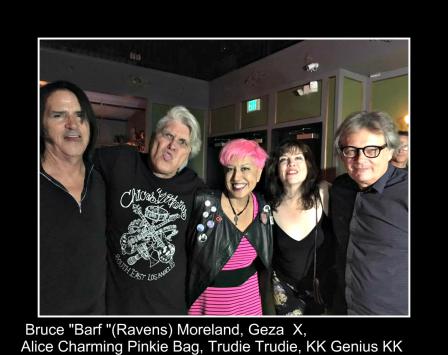
Punk Globe: Tell the readers about your relationship with The Screamers?
Geza: I took that job because they were one of my favorite bands. I BEGGED them to let Paul Roessler be in the band when they were looking for a keyboard player. I had been dating his sister Kira (future Black Flag) at the time, she was very cute and played bass well, especially considering she was barely 16 at the time. We used to do weekend jam sessions in their garage in the valley. They were both super talented musicians and eventually ended up in my band The Mommy Men. The Screamers were very exclusive and snobby. They had a house on Wilton Av in East Hollywood they called The Wilton Hilton. We threw some insane parties there. There was one famous food fight where I painted the walls with food and someone dumped a whole pot of spaghetti on the floor, which we proceeded to turn into a slip-n-slide. Rick Santen (future Golden Voice maven), all of 15 years old, became their fan club manager and we started to sell out the Whisky and other venues after he got involved.
Punk Globe: You changed their sound dramatically, didn’t you?
Geza: I was sort of like the 5th Screamer, they gave me a free hand with their sound and tech so I worked with KK on his drum set to get the tom toms to sound more like a bass. You have to remember that band had NO bass player. And I split up the left hand of Paul’s keyboard so I could put the low notes through a separate bass amplifier. Then I added a Roland Space Echo into the soundboard before every show so I could dial in all the fantastic echo effects we used at their shows. At one point in each show, they would walk off the stage completely and let me do a long echo solo, consisting of delay chains I had built up from the drums, synthesisers and vocals. People would wonder how they did that, it was all echo effects from the mixing board! But those in the know would turn to the mixing nest and give me big thumbs ups. It was so exciting to FEEL the power such a minimal band could create, and to be a part of that! They were amazing to work with, intensely creative people. Well those shows gained me a major reputation as a soundman. Bands would hire me to go mix them in San Francisco. So I started to spread the word that I was a “record producer”. Frankly, I didn’t even know what that was! But I started to mention it at the Masque and people became interested.
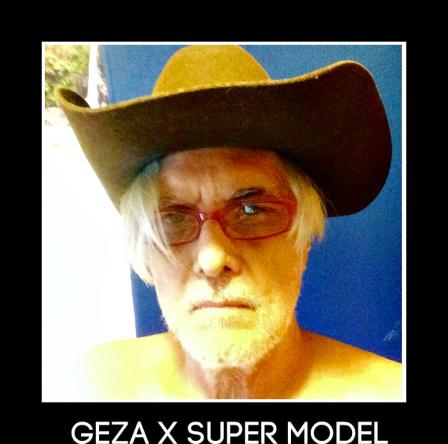
Punk Globe: One of the first recordings you did was “Lexicon Devil” by The Germs. It became the first recording ever for Slash Records. How did that happen?
Geza: One thing I can say about Darby was that he was a trendsetter. He was always an early adopter. One day he just tapped me on the shoulder at a Masque show and said “You a producer? Produce The Germs!” That’s how quickly things happened in those days. I wasn’t a big Germs fan but later I found out it was for Slash Magazine and that got me excited. About the same time Don Bolles arrived from Phoenix Arizona with the definite goal of joining the Germs. We were rehearsing for the single in the girls bathroom of the Masque. Nickey Beat was already slated to play on the single. So Darby let Don audition during one of the rehearsals. The hipsters hanging around the scene didn’t like Don yet, he had bug eyes and they called him “cactus head”. But Darby pulled me outside after the audition. We sat on the bench outside the bathroom and he asked me “What’d you think??” in his fake New York accent. I pondered it for a minute and said “Well, he’s not the best drummer but ANYONE who drives all the way from Arizona to be in your band SHOULD be! He’s gonna be loyal and his drumming will get better.” Which is exactly what happened.
Punk Globe: Certainly Don has become a legend in his own right.
Geza: Very true, he became one of the best drummers in town and also one of my closest friends for the past 30+ years. He currently plays in Ariel Pink and tours the world with them. He also has a wonderful Glam band called Fancy Space People. I think Don is an unsung genius—he is extremely talented and intelligent and witty. In fact we are working on a movie about the early Hollywood scene together, I brought him in to do the interviews and to narrate. He has such a great radio voice, you know. He wrote a good portion of the story line too, with the help of the amazing Go Go’s blog that is posted online, and a cat named Ryan Isbell who storyboarded it. I’m directing it and Kurt Porter, who has worked on many films and TV documentaries, is the editor. Its almost finished thank God. Its been a labor of love for over 5 years.
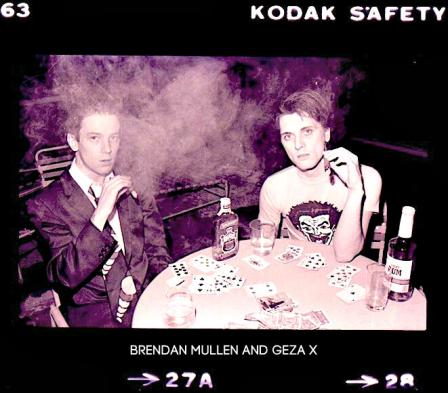
Photo by Michael Yampolski
Punk Globe: After growing up with all the different types of music you mentioned, how did it feel to work with all these bands and labels like Slash records ? Did you feel like you were part of something new ?
Geza: For me it was the MUSIC, and always will be. I loved the hippie culture that I grew up in. That’s my original roots. I’m more of a peace and love type of person. But I’m also an art anarchist who loves Dada, so the “bad is good” reversals of Punk Rock made a kind of wicked sense to me. My friends in Silver Chalice were always talking shit about hippies and making crude Nazi jokes so I took it for what it was: “This is OUR scene and we are really scary! So STAY OUT!!” It wasn’t till the so-called “2nd Wave” when all the jocks from the hardcore scene came along and tried to copy what they saw on TV, that the creativity and musical Dada that was Original Punk began to die. I mean, like I said before, our original influences were Captain Beefheart, Blue Cheer, The Seeds, Rocky Horror Show, and Iggy. Any of the original punks will tell you that. I loved the Hardcore bands from Orange County like Adolescents, Black Flag, Middle Class, they were some of our dearest friends. And great bands. But frankly all us early Hollywood punks hated their AUDIENCE, the posers who ended up taking over the scene with violence and drama. I can handle myself just fine in a slam pit, but you always notice there are NO GIRLS at those shows. Its just a meat market and locker room for closet gay boys.
Punk Globe: You went from producing “Lexicon Devil” to producing “Holiday In Cambodia” by The Dead Kennedys. Did you enjoy mixing Ray’s guitar and creating the sound at the very beginning of the song?
Geza: I didn’t create Rays guitar sound. It was his own genius to use an Echoplex tape echo in a punk context. Actually the DK’s arrived on the scene sounding fantastic! I remember meeting them at Zim’s (sort of like Denny's) in San Francisco after The Screamers did a shoot at Target Video. Jello said “We are gonna start a band!” in that famous voice of his. Curious, I asked “…well, what are you going to CALL it?”. And he replied: “THE DEAD KENNEDYS!” (laughs). I thought that was great and said so, secretly wondering if they could live up to it. They looked like geeky kids fresh out of high school at the time. Well, not long afterward I went up to SF again with The Screamers to do a show at The Mabuhay Gardens, the hot punk club at the time. And guess who was opening for them? The DK’s. I was outside when their set started and heard this thunderous echo guitar coming out of the club so I went inside to see who it was. I pushed up really close to the speakers, they were right at stage level in those days. And then I saw BIAFRA, doing his Tomata Du Plenty inspired antics, mugging toward the crowd. It was the first opening guitar riff of Holiday In Cambodia. As the song built to its amazing crescendo, I remember thinking I would practically give up my left nut to record that song. I instantly knew it could be a monster hit. And it was. Yeah they were a great band from Day One.
Punk Globe: How did that recording come about?
Geza: Things happened so FAST in those days. Not long after I saw them in SF, I got a phone call from Jello, who had heard my Dangerhouse productions and wanted me to produce their follow up single to “California Uber Alles”. I inquired what song they had chosen. When he said it was “Holiday In Cambodia”, I just about had an orgasm. I KNEW I was about to record a colossal song, and felt lucky, considering it was maybe my 4th production. Of course I jumped at the chance. I still get royalties from that song, thanks to Ray. He’s awesome. Not many indie labels do that.
Punk Globe: How did you get such a big sound?
Geza: Its ridiculously difficult to capture a punk rock song with that much power and fire on tape. For one thing, the studio had a defective recorder so I had to stop the gigantic, heavy 2” reels with my bare hands after each rewind. I had scabs on the palms of my hands for months afterward. And what sounds huge on stage gets very thin and small on little home speakers. So I dragged Rays amplifier into the actual echo chamber of the studio. In those days, some studios had a cement room with a speaker on one end and a microphone on the other, to get a “live echo” sound. But we took the whole amp in there and put about 5 microphones up in different places. And then I TRIPLE TRACKED some of the guitar parts and QUADRUPLE TRACKED some of Jello’s vocal parts.That means we recorded the identical part several times on different channels of the tape recorder to thicken it. So the song builds, with more guitars and more vocals as you go from the verse to the B section to the chorus. Of course, it’s punk rock so you need to conceal your production tricks, no one wants to know there's reverb and all sorts of mix cleverness going on. It should just sound BIG. I did the first mix but to East Bay Ray’s credit, he did the final mix using the mix notes Jello and I had sorted out on the first attempt. Well, with a little help from English mastering genius Porky Prime Cuts, THAT became the 12” single that turned California Punk into an international OMG event.
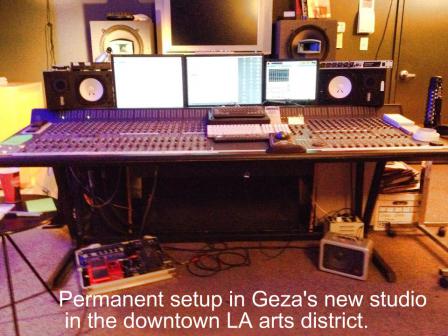
Punk Globe: I got so excited when I first heard “Six Pack” by Black Flag. It was so fucking energetic. What was it like producing it?
Geza: That record was a collaboration between me and their regular producer, Spot. It was a co-production. Spot brought some very unorthodox methods to the project, like putting 4 microphones right onto one speaker sometimes, and he raised Dez’s microphone. way up high, like Lemmy in Motorhead does it live. So the singer has to strain a little and sing UPWARD. I was puzzled at first but I really liked the sound that made on Dez’s vocal. Greg had good engineering chops too, he had a Power Soak on his speaker cabinet, another thing I was unacquainted with. That allowed him to crank the amp to 10 but it lowered the volume coming out of the speakers to about half intensity. That made it easier to mic it without overloading the mikes. I was a bit skeptical because I like the extra distortion of a speaker running really HOT. I still think the guitar sounds like a tin can on that album but I LOVE Greg’s amazing out of control guitar parts, a style very dear to my heart.
Punk Globe: Did you think hardcore bands were creative or not?
Geza: Black Flag, The Minutemen, and Fear also, never got the credit they deserved for being highly experimental bands. The kick-ass politic of 2nd wave Hardcore sort of took over and I seriously doubt if all the jocks who were attracted to that music knew just WHAT inspired them to such a frenzy. But I think it was the arty anarchy of the actual music. Frankly ALL the punk bands I worked with were very fun, creative, and pleasant in the studio. Remember, I was one of their own and could get just as drunk and disorderly as the worst of them. Many bands asked me to consult on their recordings or used my equipment.
Punk Globe: Really? Like who?.
Geza: Pat Smear never had a guitar through the whole early days and borrowed mine most of the time. In fact that’s my Firebird with the “DANGER” sign on it in DECLINE OF WESTERN CIVILIZATION. And Social Distortion used my pedalboard on Playpen and the other songs on the first PoshBoy recording. It was a tribal movement and everything went like that. We were so poor we HAD to share equipment. The original scene was very tightly knit, after all there were really only about 30 of us at first, until the crowds started showing up. And even then, it was a small group of 200 Original Punks until the second wave Hardcore scene happened. Even the hardcore bands can trace their origins very far back to the Masque, they were our roadies or our early audience and drove a great distance to be in the epicenter, which was The Masque. We had a filter but when we found out they were cool, we embraced them as friends. Then they went back home and started their own awesome bands.
Punk Globe: So you’ve had a number of hits, like the feminist anthem “Bitch" by Meredith Brooks, that went to #1 for 4 weeks. What was your impression of working inside the record business? Was it different?
Geza: I hated it. They exploit everything, they steal ideas, they play mind games. After “Bitch” I decided to go underground again. I took the money and, with my ex-girlfriend and business partner Josie Cotton (“Johnny Are You Queer?”), built a palatial studio on a 4-acre property in Malibu. We ran that for 13 years till the housing crisis screwed things up. And we ran it as an INDIE studio, giving indie bands the same red carpet treatment that a major-label would, at indie studio prices. Paul Roessler came onboard and started working with us after a while. That's where he learned to engineer. We recorded well over 200 great bands, Dave Vanian and Pat Morrison worked there, as did Elliot Smith, who named the place “The Garage On The Hill” for his last album before he died. Sadly, he was very messed up on drugs. I tried to get him into AA but it was no use. That album was produced by Josie's BF at the time, David McConnell, and was one of the last things to come out of that amazing studio. We called the place Satellite Park. Paul and Josie have now moved on and started their own studio, Kitten Robot. It's a beautiful place, highly recommended.
Punk Globe: After all this adventure, what are you doing to stay current?
Geza: I am reinventing myself as a model. For some inexplicable reason, at age 66 I look better than I’ve ever looked in my life. Go figure. And I have so much experience working on both sides of a camera that it's a no-brainer. The modeling world is opening up to different styles, there’s black brown white and even transgender and elder models now. In fact, that scene is evolving so rapidly that its dizzying. After all, people DO like new looks, the same way they like new sounds. So Its been fun stepping into that world. But I still love hearing new songs, which is why I continue to master indie records. This is an amazing era, recent technology allows me to do studio-level work, even in an airport or hotel room. Plus I’m addicted to the new synthesizers available on laptop computers and iPads. So I keep really busy making music and noise with all that tech. I’ve even done some film soundtracks-- the most recent being “Snake Outa Cmpton”, a hilarious romp in the style of Grabbers or Big Ass Spider. I’m a lucky guy, I will admit I’ve led a charmed life. I’ve always had the privilege of doing whatever I want, on my own terms. I never had a normal job. So this is nothing new. I follow my curiosity, wherever that leads me. And that has kept me plugged in and fresh through one era after another.


